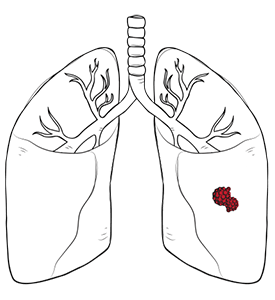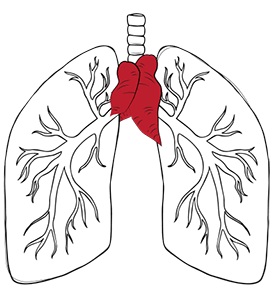

The thymus is a small gland located just under the breastbone (sternum) and in front of your heart. Its main purpose is to produce immune cells as the body develops, and it typically shrinks as the body grows. During early childhood into puberty, the gland is important for development, and past that point, starts to be replaced by fat.

For some people, the thymus may present a problem. The gland can either develop a tumour, malignant or benign, which may warrant removal.
Thymectomy in myasthenia gravis cases occur when immune cells start to attack the connections between the nerves and muscles. This leads to weaknesses in various muscle groups across the body and may warrant treatment.
In both of these situations, the solution in most patients is to remove the thymus via a thymectomy, especially since it no longer serves a purpose in most adults.
Neumark surgeons will perform the thymectomy using the most advanced technology to ensure a safe surgery. Minimally-invasive RATS (robotic-assisted thoracic surgery ) and VATs (video-assisted thoracic surgery) are the recommended course of treatment.
These thymectomy surgery steps and techniques ensure the best possible outcomes and a virtually unnoticeable thymectomy scar.
Whichever method is chosen, the intended goal of the surgery is to remove as much of the thymus as possible, either to remove a growing tumour or to prevent the thymus from mistakenly producing the immune cell response that causes myasthenia gravis. Surgery typically lasts between 1 to 3 hours.
If you are concerned about your thymus, visit us at Neumark Surgery to speak with one of our surgeons to find out if a thymectomy is right for you. Every person’s body differs, so picking an appropriate treatment plan for your health is vital to achieve the best possible outcomes.
At Neumark, we use advanced solutions through innovative technologies to achieve healthy outcomes for our patients. For example, some surgeons may conduct open surgery via a median sternotomy approach for a thymectomy which increases the potential risk, whereas RATS or VATS only involve smaller incisions and speeds healing time and reduces the recovery process. Thymectomy success rate and risks are dependent on the patient’s health. Speak with our surgeon today about any of your concerns to determine if a thymectomy is the right treatment for you.
Myasthenia gravis remission after thymectomy is a promising development in the treatment of the autoimmune chronic condition. Recent studies have also uncovered that the timing of thymectomy in myasthenia gravis may be an important factor. Thymectomy, the surgical removal of the thymus gland, can improve symptoms of myasthenia gravis by halting the production of antibodies that attack the neuromuscular junction. However, the level of improvement or remission varies from patient to patient. The decision to undergo thymectomy should be made with the guidance of a thoracic specialist or surgeon. Further research is needed to fully understand the long-term effects of thymectomy on myasthenia gravis and its potential for inducing remission.
Recovery differs from person to person. Some patients may have to stay overnight in the hospital following a thymectomy for observation and to ensure a healthy recovery. All patients will be advised to avoid strenuous physical activity following a thymectomy to ensure optimal recovery. Scarring for most patients is minimal, since RATS and VATS only involve minor incisions. The risk of recurrence of a thymoma following a thymectomy would depend of the stage and type of thymoma. For peace of mind, your surgeon will likely ask you to schedule a CT scan every five years to ensure that there are no recurrences.
Thymectomy is not without risks and potential side effects, including pain, fatigue, difficulty swallowing, bleeding, infection, or injury to nearby structures. Some patients may also experience anesthesia-related or underlying medical condition-related complications. Therefore, a thorough assessment of potential risks and benefits with healthcare providers is crucial when considering thymectomy as a treatment option.
DISCLAIMER: The information provided on this website is for general informational purposes only and is not intended as a substitute for professional medical advice, diagnosis, or treatment. The use of this website does not create a doctor-patient relationship and no medical advice should be inferred or assumed. It is the user’s sole responsibility to seek the advice of their healthcare professionals for any medical concerns they may have and the user should not disregard, or delay, prompt medical advice for any such condition.
Neumark Lung and Chest Surgery Centre benefits from the expertise of a multidisciplinary team led by Dr Harish Mithiran, senior consulting thoracic surgeon at Gleneagles Hospital and Mt Alvernia Hospital.
Neumark is a lung and chest specialist centre with access to leading treatment modalities to achieve the best possible outcomes for lung disease and preventative patient screening.
Our foremost priority is to treat your condition as effectively as possible. Schedule a private consultation today; complete the form below, call, +65 6908 2145; WhatsApp, +65 9726 2485; or email, info@neumarksurgery.com.
Access the latest advice as well as full support throughout your treatment, and during after-care.
Learn how to refer a patient or to joining our physician network of leading providers in Singapore and abroad.
Main Surgery Centre
6 Napier Rd
#02-09 Gleneagles Medical Centre
Singapore 258499
820 Thomson Road
#06-07 Mount Alvernia Hospital Medical Centre A
Singapore 574623
Neumark Lung & Chest Surgery Centre benefits from the expertise of a multidisciplinary surgical team led by Dr Harish Mithiran, a senior consulting thoracic surgeon at Gleneagles Hospital.
With access to leading minimally-invasive treatment modalities for lung disease and chest conditions, our specialists in Singapore work to achieve the best possible outcomes for lung disease. Our foremost priority is to treat your condition as effectively as possible with world-class care.
6 Napier Road
#02-09 Gleneagles Medical Centre
Singapore 258499
820 Thomson Road
#06-07 Medical Centre A
Singapore 574623
© 2024 Neumark Lung & Chest Surgery Centre Pte. Ltd. | UEN 202136971R
Gleneagles Medical Centre
6 Napier Road
#02-09 Gleneagles Medical Centre
Singapore 258499
Mount Alvernia Hospital
820 Thomson Road
#06-07 Medical Centre A
Singapore 574623